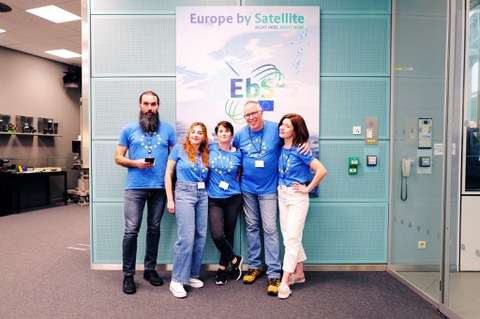Study what you like - and motivates you!
(interviewed in the year 2024)
Thomas Scheufler
“Learning German opened doors for me and changed my life.” Dora Pelin moved to Dresden and stayed - because of the cultural diversity, the comprehensive university and the Excellence Initiative. She studied German Studies and Art History at TUD and currently works as an Administrative Assistant and Linguist Assistant at the European Commission.

Dora Pelin is the graduate of the month for August 2024.
| Profile | Dora Pelin |
| Degree program | German Studies (Literature and Cultural Studies) & Art History |
| Faculty | Faculty of Linguistics, Literature and Cultural Studies |
| Study period | 2012 until 2016 |
| Current work | Linguist Assistant for Croatian in the Croatian Language Department of the Directorate-General for Translation of the European Commission |
Why did you decide to study at TU Dresden?
I chose TUD because I fell in love with the city! I knew very little about the university as I had never been to Dresden before and had no experience, but what appealed to me was the concept of a comprehensive university and the Excellence Initiative. Besides, if you want to study German Studies and Art History, Dresden, with its rich culture, is definitely one of the best cities for this combination!
What made you choose this degree program?
I learned German as a foreign language at high school and fell in love with the language. After a student exchange in Germany, I became even more enthusiastic about the language and the country, and at some point, I had a great desire to study German in Germany. I wanted to delve deeply into the language and German literature, so studying German was a natural choice. I have also always been passionate about art and wanted to study it in German - it may sound trite and cheesy, but my choice of study was purely emotional and intuitive!
Who from research and teaching influenced you the most during your studies?
It was Prof. Gudrun Loster-Schneider - she dealt with the polymethodical cross-sectional discipline of gender studies and organized great cyclical lectures, seminars and colloquia on modern German literary and cultural history for students of all degrees and programs. Her perspective was always historically sensitive and interdisciplinary, and the content was always related to current issues. I also wrote my Bachelor's thesis under her supervision!
Where are you employed today, and what are your responsibilities?
Today I work at the European Commission - I have just been made a civil servant after going through an extensive selection procedure. After working for 1.5 years in the Audiovisual Unit of the Directorate-General for Communication, I joined the Croatian Translation Unit on May 16, 2024. I will be working there as an Administrative and Linguist Assistant, ensuring that all written texts from the European Commission are flawlessly translated into Croatian and made available to EU citizens.

Dora Pelin (right) with colleagues from the EU Commission's audio-visual service, with the poster of Europe by Satellite (EbS), the European Union's news channel.
What advice would you give to our current first-years?
To study what they like and motivates them. You should also think about how you can combine the content with practice and use what you have learned in life in the long term. And: I made my way into the Commission via the so-called Blue Book Traineeship, which I completed last year. The traineeship program could be interesting for many students from different disciplines!
What do you remember most fondly about your time as a student?
Overview lectures on different periods in Art History and coffee breaks with fellow students, especially outdoors in summer.
What was your favorite place on campus?
Very important - when it comes to the essentials, namely food - then it was definitely the Asian food counter in Reichenbachstraße! I ate there almost every day in my final year. Otherwise, the SLUB - it became my second home during my Bachelor's thesis. The social aspect made the whole thing better - I met up every day with friends who were also writing their theses and we supported each other.
What still has a lot of value for you today/would you like to have had more of?
In general, the experience of studying abroad and in an international environment was not only super interesting and enriching on a content, professional and personal level, but also the impetus and guide for my further academic career, and thus also my later career. In retrospect, I can say that learning German, studying in Germany and other international experiences have opened many doors for me and changed my life!
What tips do you have for hitting the ground running in your industry?
As studying German and Art History is very theoretical, it is particularly important to get involved alongside your studies - by working part-time or doing internships. You should do as much as possible to gain (relevant) experience outside the university world. It's a great way to see what you're interested in, but also to get to know people and build networks. I think this is really the most important point. Experience provides you with concrete skills and also increases your self-confidence, and if you combine this skillfully with the social aspect and get to know people, it can be very beneficial!
What connects you to TU Dresden today?
Haha, obviously the alumni network - I like to check out the newsletter to see what else has happened at the university since I left (which is quite a while now), in general and in my special field.
Contact:
Dora Pelin
